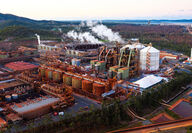Sorted by date Results 1 - 8 of 8

Alongside critical minerals demand, there's another shortage in the U.S. that has the mining industry just as worried – fresh faces in the labor pool. The global economy is in the midst of a mineral-intensive green energy transition that involves more electric vehicles powered by better batteries, and 2030 is the first self-imposed deadline in many countries for phasing out internal combustion engines. At the start of the new decade, more than half the current mining i...

Impressing the necessity of developing domestic supplies of critical minerals, the U.S. Department of Energy's Office of Fossil Energy and Carbon Management has issued a notice of intent to fund programs that will advance cost-effective and environmentally responsible production, reuse, and recycling of critical minerals and materials in the United States. As part of the $1.1 trillion Bipartisan Infrastructure bill, this latest funding opportunity is aimed to support bench-...

Common cement and carbon black pave the way for a foundational tech for efficient future energy storage. Channeling the power of the ancients, a team at the Massachusetts Institute of Technology announced they have developed a supercapacitor from two of humanity's most ubiquitous historical materials – cement and carbon black. Possibly the foundation of a novel, low-cost energy storage system, according to a new study, this technology could facilitate the use of renewable e...

Lynas to apply the Pentagon funds to develop the first heavy rare earths separation facility outside of China. Continuing its heavy investments into America's critical mineral supply chain, the U.S. Department of Defense has allocated roughly $258 million to support development of the Lynas U.S. Rare Earths processing facility in Texas, which is more than double the original $120 million price tag for establishing the first large-scale heavy rare earth elements separation plan...

Rio Tinto and Sumitomo Corp. have teamed up to build a demonstration plant aimed at reducing greenhouse gas emissions from the production of aluminum. The A$111.1 million (US$73.9 million) pilot project, the first of its kind deployment of hydrogen calcination in the world, will be built in Australia at the Yarwun Alumina Refinery in Gladstone, Queensland. The project, co-sponsored by the Australian Renewable Energy Agency (ARENA), which contributed A$32.1 million (US$21.3 mil...

Possible Nobel Prize-winning invention has the wider science community in a frenzy; initial claims shrouded with skepticism. If you follow any kind of cutting-edge, pioneering, and borderline science fiction-level technology news, you may have come across LK-99. What had started as a likely dubious claim by more doubtful researchers has become a veritable online race for a room-temperature superconductor that, by the apparent furious attempts to replicate the claims, lends...

Heavy investment in mining required to ensure enough raw materials are fed to EV battery gigafactories; key to energy future. Benchmark Minerals Intelligence cautions that the gigafactories being erected around the world will be "about as useful as grain silos" unless hundreds of billions of dollars are invested in ensuring that there are plentiful supplies of the cobalt, graphite, lithium, manganese, nickel, and other raw materials these factories require to manufacture the...

NRC issues permit needed to process stockpile of high-grade rare earth material through Rare Element's demo plant being built in Wyoming. Surpassing another major milestone on its path to offering a long-term, reliable, and sustainable domestic supply of separated rare earth elements, Rare Element Resources Ltd. has been issued a license necessary to process previously stockpiled material at its Bear Lodge project in Wyoming. Located in an area of northeastern Wyoming with...